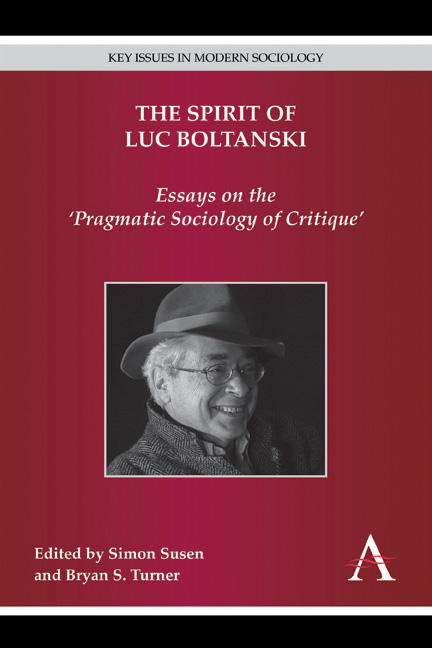Book contents
- Frontmatter
- CONTENTS
- List of Contributors
- Preface
- Part I Introductory Remarks
- Part II Luc Boltanski and (Post-) Classical Sociology
- Part III Luc Boltanski and Pragmatism
- 2 Did You Say ‘Pragmatic’? Luc Boltanski's Sociology from a Pragmatist Perspective
- 3 Why (Not) Pragmatism?
- 4 The Moral Idealism of Ordinary People as a Sociological Challenge: Reflections on the French Reception of Luc Boltanski and Laurent Thévenot's On Justification
- Part IV Luc Boltanski and Critique
- Part V Luc Boltanski and Critical Sociology
- Part VI Luc Boltanski and Political Sociology
- Part VII Luc Boltanski and Contemporary Issues
- Part VIII Luc Boltanski in Conversation
- Part IX Luc Boltanski and His Critics
- Index of Names
- Index of Subjects
2 - Did You Say ‘Pragmatic’? Luc Boltanski's Sociology from a Pragmatist Perspective
from Part III - Luc Boltanski and Pragmatism
Published online by Cambridge University Press: 05 December 2014
- Frontmatter
- CONTENTS
- List of Contributors
- Preface
- Part I Introductory Remarks
- Part II Luc Boltanski and (Post-) Classical Sociology
- Part III Luc Boltanski and Pragmatism
- 2 Did You Say ‘Pragmatic’? Luc Boltanski's Sociology from a Pragmatist Perspective
- 3 Why (Not) Pragmatism?
- 4 The Moral Idealism of Ordinary People as a Sociological Challenge: Reflections on the French Reception of Luc Boltanski and Laurent Thévenot's On Justification
- Part IV Luc Boltanski and Critique
- Part V Luc Boltanski and Critical Sociology
- Part VI Luc Boltanski and Political Sociology
- Part VII Luc Boltanski and Contemporary Issues
- Part VIII Luc Boltanski in Conversation
- Part IX Luc Boltanski and His Critics
- Index of Names
- Index of Subjects
Summary
If you are not certain of any fact, you cannot be certain of the meaning of your words either.
(Wittgenstein, 1969–75, §114)Things are not just as we choose to think them.
(Peirce, 1982: 358)From its seeming to me – or to everyone – to be so, it doesn't follow that it is so. What we can ask is whether it can make sense to doubt it.
(Wittgenstein, 1969–75: §2)Luc Boltanski's sociology has been labelled ‘pragmatic’, and the author now uses this label to characterize his research endeavour. What does this designation mean? In this chapter, we shall examine what exactly such a qualification is about, and we shall do so from a pragmatist point of view. Let us say straightaway that we do not see what is truly ‘pragmatic’ in Boltanski's sociology. From a pragmatist perspective, it appears as a continuation of the classical dualisms of European thought, and the critique it proposes seems to make the same mistakes as the wholesale generalizations of social theory. After having recalled why Boltanski deems his sociology ‘pragmatic’, we shall provide an evaluation, which will be divided into three parts. First, we shall show why and how – paradoxically – this kind of ‘pragmatic sociology’ depreciates the domain of practice. Second, we shall argue that a form of ‘disregard of the social’ characterizes Boltanski's approach, resulting from the kind of Hobbesian anthropology on which his theoretical framework is based. And, third, we shall reflect on the need for a ‘critical sociology’, including a theory of domination and emancipation.
1. What Is ‘Pragmatic’ about Boltanski's Sociology?
Boltanski calls his sociology ‘pragmatic’ in reference to linguistic pragmatics, and, more precisely, to the common distinction between semantics (which defines meaning as a relation between a symbol and a denoted object) and pragmatics (which examines the contextual uses of language and meaning's dependence on context). In addition, Boltanski explains that his sociology is ‘pragmatic’ insofar as it analyses social orders from the perspective of action and actors (Boltanski, 2006: 11; 2009: 35).
- Type
- Chapter
- Information
- The Spirit of Luc BoltanskiEssays on the 'Pragmatic Sociology of Critique', pp. 91 - 128Publisher: Anthem PressPrint publication year: 2014

